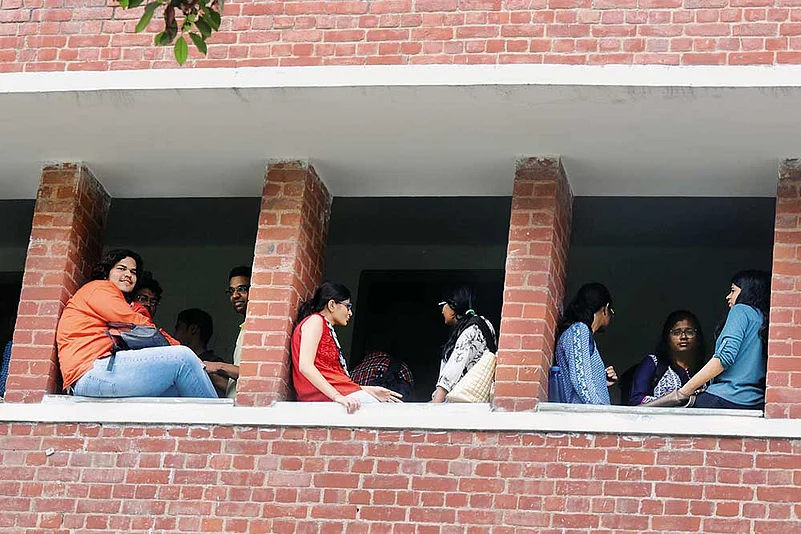One of the major challenges that India faces in today’s time is its need to truly enable its large youth population. In turn, when this begins to happen, we shall begin to meet the emerging and vital needs and challenges of the future. India, like all nations, faces many challenges. Any insight into how nations successfully tackle their needs and challenges consistently reveals that knowledge systems have played a significant role. As things stand, India has come a long way and most certainly, our knowledge systems such as universities have played a major role, be it in the distant past when the invention of the rapalgai was so successfully used for deep sea navigation or the crafting of the green revolution in modern times.
A university can be deemed to be a university of the future if those who pass through its portals have become adept at engendering solutions to the problems that beset society. As an illustration of a futuristic solution, take the case of how the human race tackled the scourge of smallpox. Instead of staying with the mundane practice of providing piecemeal remedies after the disease had struck a patient, 18th-century English physician Edward Jenner broke the mould and invented the concept of vaccination. As a result, not only has the world been rid of smallpox, but the concept of vaccination has also led to the eradication of polio and many other dreaded diseases.
Given their energy and idealism, the youth in any society tend to be easily INSpired and motivated by the thought of engaging with social needs. What is generally needed is to give them the right training and tools—and that is the job of any university, not just a university of the future. Thus, by its very raison d’etre, a university is not really a university unless it is engaged with the future. So, to my mind, all universities have no choice but to be universities of the future. It is, therefore, useful to try and identify the challenges and goals looming over the horizon, and use them as a collective touchstone and compass when dealing with the idea of a university of the future. Such a listing will necessarily include artificial intelligence, robotics, big data, climate change, environmental degradation, disease prevention, public transportation, national security, engendering the well-being of the rural population, slum redevelopment and so on.

It now becomes almost self-evident that any UNIversity of the future must have a curriculum that INSpires and engages the minds of the young. It is only then that they will endeavour to create ideas and be truly innovative. This really translates into enabling the young to find their calling in life.
Another way of putting it is to say that we are, each one of us, born with an inner drumbeat, and we begin to get truly educated when we start discovering our inner drumbeat or antardhwani, and start marching in the real world in harmony with that drumbeat. A young mind identifies its drumbeat by engaging with the various drumbeats that emanate from the different needs and challenges of society.
For many young folk, finding one’s drumbeat may not really involve a formal university system, as in many ways the world at large is a university in itself. The sooner a university of the future recognises this, the better it will be. Take the example of Mahatma Gandhi, whose inner drumbeat required him to march in harmony with the truth. He was fortunate to have found this antardhwani through engaging with a play on the life of the legendary king Harishchandra at tender age. He embarked on his quest for truth right then, and that set the tone for the Gandhi of the future. Nineteenth-century English scientist Michael Faraday too found his inner drumbeat through a non-formal setup, when he was apprenticed to a bookbinder at a young age.
Srinivas Ramanujan found his calling in life—mathematics—while still a schoolboy. Bhagat Singh too found his drumbeat as a teenager when he saw the need of freeing the nation from the yoke of foreign rule.
So for many truly great individuals, the world at large played the role of a university. However, for the vast majority, to find what resonates with their inner drumbeat is a quest on which they embark when a university stimulates their minds with various issues and happenings of the real world. So a university of the future must draw up a curricular platform where each individual is drawn to engage with something or the other from the real world. Such an engagement makes a student search within to find her personal drumbeat. And that sets the tone for the future. Are we as a nation successfully able to provide such a platform of learning for our youth? The answer is emphatically in the negative as the most salient feature of such a platform of learning is that those who pass through its portals must find fulfillment in some tangible manner.

How does one gauge the situation in India? A few years ago, the University of Delhi invited a leading multinational firm for a campus placement exercise. The firm had a few hundred openings for graduates that needed basic communication and analytical skills. The UNIversity advertised widely and shortlisted 1,200 of the best resumes and organised blind interviews. The firm picked up only three students. And what about the famed IITs? Here is a sample from among many frank opinions expressed by students at a well-regarded IIT: “The three-and-a-half years are an academic void. The little I learnt during the course while mugging for exams got erased as soon as the exam was done.” The story goes on and on.
The other important factor we need to tackle is our easy embrace of mediocrity in the education sector. This is readily recognised not just by our inability to win a Nobel prize, but also by the realisation that no Nobel laureate from anywhere seems to be even mildly inclined to spend any meaningful time at any Indian university.
Our quest for a design of the future must also take into account the staggeringly large numbers of students. For instance, this year more than 35 lakh students have graduated from high school through the examinations conducted by the Uttar Pradesh, Bihar and CBSE boards. The University of Delhi, one of India’s largest, admits about 55,000 each year. One can only try and imagine the picture for the entire nation. Thus, for a university of the future, a very out-of the-box design is mandated. Through the use of artificial intelligence and meaningful and judicious use of IT-based learning platforms, much knowledge can be imbibed by large groups of students with enjoyable experiences that are increasingly more fulfilling than most classroom experiences.
Of course, this also requires the teacher to be an enlightened mentor who sees value in hands-on activity and team-based project work that needs a trans-disciplinary approach. The university must realise that knowledge comes in many forms, that all human and worldly activity has a knowledge component, that knowledge without action is meaningless, and that skills and knowledge are two sides of the same coin. They must grasp Gandhi’s dictum in the context of education: “What you do with your hands enters your heart.”
The university shall have to embrace technology creatively and large-heartedly. The young today can and do adapt very easily. They must be given freedom to innovate and experiment, and learning must be student-led.
For research and knowledge generation, such a university must recognise that more and more knowledge seems to be coming out of enterprises outside formal systems, such as ISRO, Tesla, Google andVirgin Galactic, and in an all-encompassing manner, through the web. The endeavours of individuals such as Kabir, Guru Nanak, Gregor Mendel, Craig Venter, Elon Musk and many others must also be pointers to where much knowledge can come from or where it is being put to use for the future.
So the university of the future shall have to ensure that the young are in a position to know what it takes to create such enterprises and the basic skills needed to be a part of such enterprises. For the students of the immediate and distant future, their desire and need to gain knowledge should be met not so much through the campus-based environment as by technology-enabled experiences, and a peer-led and enjoyable learning mode. The university shall just be an enabler and enlightened mentor that lets learners proceed by themselves. Students shall engage and become aware of the power of quantum computing, artificial intelligence, robotics and big data, and these shall have to be made second nature to them. Technology through AI and computers shall be the learning platforms for the university of the future, and a good university shall also redesign enlightened ways of according credit and assessing. India shall then truly prosper.
Also Read
Dinesh Singh, Former VC, Delhi University, and adjunct professor with the University of Houston


















